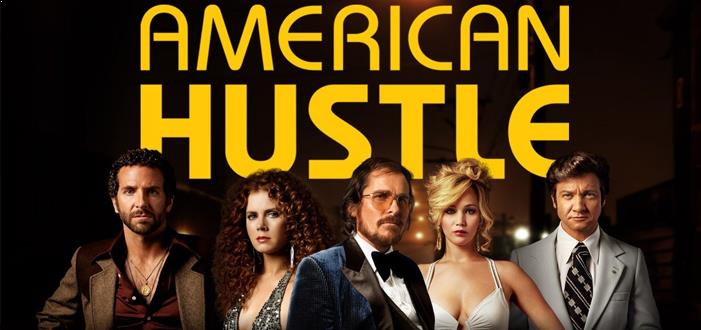
American Hustle
The film begins when the protagonist, Irving, makes a bold statement: he will not be like his father when he grows up. Clearly coming from an immigrant family, Irving sees that it is the con men who rule his neighborhood. Of course, making such a monumental life decision at the age of 10 doesn’t always seem wise, as the world tends to be magnitudes smaller – extending no more than a few blocks – than what it actually is. Becoming a big fish in a small pond as his highest ambition is setting the bar quite low.
In any case, a dog-eat-dog mentality was stirred inside of him, where he would feast off of exploiting the hapless. I am reluctant to call them “weak”, as we see the men who come to him for emergency loans are hardly that. And even then, his con business, which begins to flourish when he attracts a female accomplice, was just a sideshow to the fact he was, in the legitimate business world, a mild success, owning five dry cleaners. Granted, he must have acquired the capital to own those through grifting, but nevertheless, it is surprising how overlooked his business collection is in his life. It is as if he only validated himself through conning, as if it is the highest virtue.
Such is the backdrop when the feds come and ruin everything. Irving’s only chance at freedom is being an accomplice, teaching the bureau how to be a con artist, as well as participating in taking down a few politicians. One thing leads to another, and there is a snowball of criminality that feeds the ego of Richie, the main FBI contact. All he sees is glory behind the badge.
And what was the heinousness of the political corruption unearthed? Well, firstly, it was all instigated by the FBI themselves. Call it a soft-entrapment. The politicians were not actively seeking to break the law. So how did the ball get rolling in the first place? A desperate Newark mayor looking to re-build Atlantic City needed financing. Suffice to say, his eagerness to provide his constituents with jobs over his own self-profiteering bit him and bit him badly. But the film is not concerned with the morality of the entire operation that, like a spider’s web that continued to be spun, captured more and more insects on its periphery. It takes a neutral stance when observing the grafters and the feds. The film shows the common denominator between them is pride. And pride comes before a fall.
We are also not privy to the inner most motivations of each of the characters, and even Irving’s drive has to be deduced from his brief initial auto-biography. How each finds themselves in an underworld of manipulation and distrust, tangling with corruption and the Mafioso, especially against the backdrop of the legitimate business success Irving has as a dry cleaner, can only reveal malnourished efforts at self-improvement. The characters are all striving to move away from what they are to something they value higher, regardless of whether that higher value is legitimate or not. It is the bitter residue of narcissism that stains the glasses they drink from.
Grade: B+

